Heating fluid - views and features
Water heating in our country is the most common, which is associated with a number of its advantages. However, water is often called it conditionally, since instead of water in radiators, other types of coolant can be used. In this article, we will consider which liquids are most often used for heating systems and what their features are.
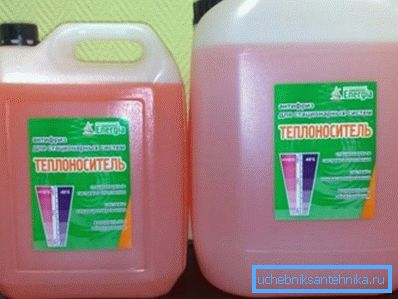
General information
First of all, it should be said that the ideal coolant has not yet been invented. Accordingly, each type of fluid is successfully used in certain conditions and has its own pros and cons. For example, an important condition is the temperature in the system, with a change in which a substance may lose its properties, and heating devices fail.
Before we consider the possible options, let us first analyze what requirements the heating system liquid must meet:
- Transferring the maximum amount of heat in a short period of time from the source of heat to the radiators. Heat loss should be minimal.
- Good fluidity, since this indicator depends on the rate of flow of the coolant, and hence the efficiency.
- Security - the liquid must comply with the norms of toxicity and ignition temperature.
- Heat carrier should not cause the formation of corrosion on the internal surfaces of heating devices.
Note! An important point is the price of the coolant. It should be either cheap or expensive, but durable, i.e. with the ability to use multiple seasons.
Therefore, the choice of coolant must be approached responsibly.
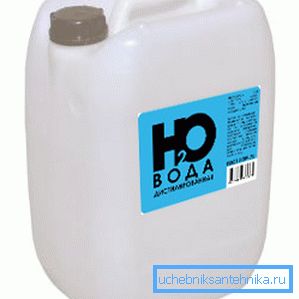
Types of coolant
So, the following liquids are most often used for heating systems:
- Water;
- Antifreeze;
- Inhibitors.
Below we take a closer look at their features and basic properties.
Water
Water is the most popular and affordable liquid for radiators.
Its benefits include the following points:
- Good heat capacity;
- Flowability;
- Environmental friendliness;
- Low cost.
Note! Batteries can not be filled with ordinary tap water, as it is saturated with oxygen and salts, which leads to the appearance of scale inside the system and the formation of corrosion.
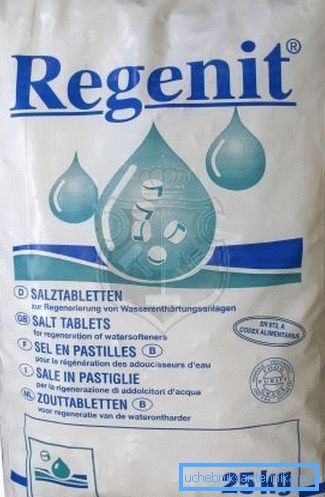
To heaters work flawlessly, the water must be softened.
This can be done in two ways:
- Thermal - in the process of boiling water from it removes oxygen and salt. True, some compounds of magnesium and calcium in this way can not be removed.
- Chemical - due to some of the reagents, all salts precipitate. After that, it remains only to filter the water.
The ideal option is to use distilled water, although its disadvantage is the need to purchase.
Note! When using water in the system, it is necessary to ensure that the temperature in the room does not fall below zero degrees. Otherwise, it will freeze and damage the heaters.
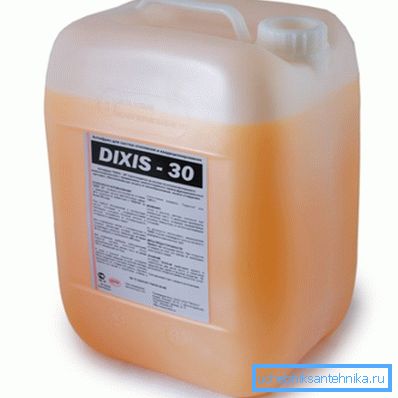
Antifreeze
The main advantage of antifreeze before water is that it freezes at much lower temperatures than water. As a rule, this liquid for heating systems can operate at a temperature of -30 or even -65 degrees Celsius.
If the temperature drops below the minimum value, the antifreeze does not freeze, but changes to a soft, gel-like state. Therefore, this fluid for water heating is an excellent option, for example, for country houses, which are visited by the owners in the winter from time to time.
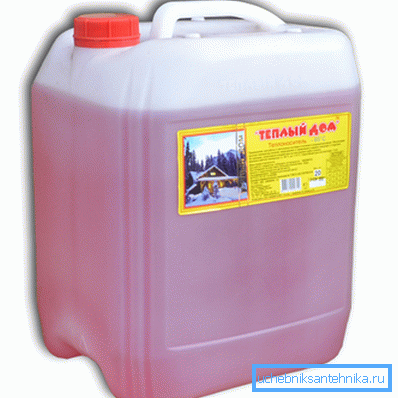
However, before choosing a fluid for heating, you should be familiar with the shortcomings of antifreeze, which are listed below:
- This heat carrier has a high viscosity, as a result, it requires a powerful circulating pump for the heating system.
- Heat capacity is fifteen percent lower than that of water. Accordingly, the amount of heat given in antifreeze is less.
- Radiators should be 50 percent larger than when using water.
- Toxicity.
- Connections require more thorough sealing.
Tip! Antifreeze can be diluted with water, which will increase its freezing temperature, but it will improve other qualities. For this purpose it is necessary to use only distilled water.
Thus, it does not always make sense to use antifreeze.
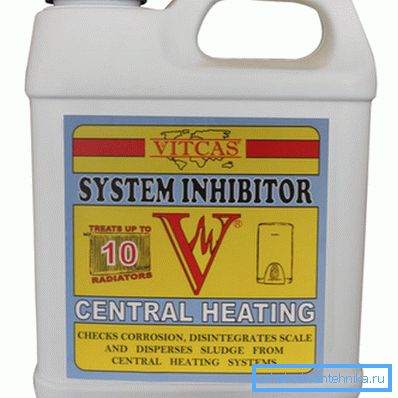
Inhibitors
Immediately it should be said that inhibitors are not independent coolant. They are added to other fluids for heating in those cases if scale or corrosion centers appear in the system. These additives are able to extend the life of heating devices for several years.
However, it should be borne in mind that inhibitors are not a universal preparation and only fit certain types of pipes. For example, some types of additives can damage polymer pipes, while others cause corrosion of steel radiators.
Therefore, before you buy inhibitors, you need to know for which types of heating they can be used. This information contains instructions on the packaging.
As a rule, inhibitors are added to antifreeze, but some of their types can be added with your own hands and into water.
Here, in fact, all the main points that you need to know about the features of the most common types of coolants.
Conclusion
In order to provide comfortable living conditions in the cold season, it is necessary to pay attention not only to the choice of heating equipment, but also the coolant for it. From this depends largely on the efficiency of heating, as well as the durability of the entire system.
From the video in this article, you can pick up some additional information on this topic.